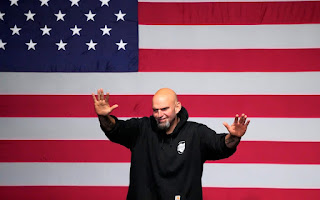Ties are an emblem of some of the most ridiculous and inescapable parts of human culture.
I wore ties for my entire teaching career. I started out of a need to differentiate between my 22 year old self and my 20 year old students. I eventually stayed with it because wearing a tie was one of my Things. And once a year, my students would get some version of this shpiel:
Who's the most dressed up person in the room? Me, of course. How do we know? Because this morning I took this magic piece of cloth and tied it around my neck. Now, it only works if I tie it like this. If I do this (throw it over shoulder) or this (loosen it to comic amounts) or this (make skinny end stick out further), I don't look dressed up. I look silly.
Why is that? And what is with that phrase "dressed UP" anyway?
Ties are a perfect example of the human tendency to make shit up and then imbue it with all sorts of Deep and Important Significance.
There's all sorts of history, including Chinese soldiers from the 2nd century BCE and Croatian mercenaries in France and so on, but it more or less boils down to "rich and powerful people thought they were cool."
I brought this up in class as an introduction to the units on usage.
Usage is not grammar, although a multitude of folks conflate the two. Grammar is the mechanics of language--what works, what doesn't, how the parts fit together. Usage is about h0ow particular words or phrases are used. When we're talking about grammar, we're talking about what works or doesn't. As the soon as the word "correct" or "proper" turns up, we're probably talking about usage.
Plenty of things that aren't considered proper usage are fully grammatical. The classic example is "ain't" a word that's considered "non-standard" or "improper" usage, but is perfectly grammatical. By that I mean that a native speaker gets that "I ain't going to the store" means something and "I'm going to the ain't" does not.
"Proper" usage is like a necktie. Most questions about what is proper usage have historically been settled the same way--whatever rich, powerful people do is correct. This is generally "decided" organically and by consensus; attempts to deliberately shape usage are very hard to pull off (see also: every attempt to fix English spelling conventions).
After the Norman Conquest, most wealthy and powerful positions in England were occupied by people who spoke French, and so the more proper usage became aligned with French or Latin based vocabulary. Attempts to codify grammar, spelling and punctuation inevitably settled debates by deferring to "how they do it in London."
It is usage (not grammar) that is used as a marker of class. Two things are true. First, these distinctions are completely made up and without any discernable basis in objective reality. In fact, when closely examined, they can look kind of dumb. Second, however ridiculous, you ignore them at your peril, because they still have enormous power in the world.
I love Fetterman. I don't always agree with his positions, but as a Pennsylvanian I will certify that he is the most Pennsylvanian Pennsylvanian who ever Pennsylvaniaed his way into government. He has defied the "proper usage" of political speech and fashion his whole career in a way that very much reflects a certain blue collar pragmatism that one finds in the state.
That said, not all usage transgressions are created equal. Shaking off the somewhat arbitrary restrictions of "proper" usage can get you the genius of Shakespeare, and it can get you gibberish. It can be a way to take back power, but the question of what you want to take back power for, exactly, matters a great deal. There are whole big conversations to be had about the power dynamics, and trying to put and keep people in their place, and trying to disrupt just because you're a chaos agent, and trying to shut people out just because they aren't adept at invoking the "proper" usage incantations. And I'm not going to post a whole book today.
But underneath it all is one big important truth--all of this stuff is made up shit. It is human beings decide to staple a hat to a penguin and then declaring that hat-stapled penguins have deep significance about the fate of society. It is about declaring that one community's traditions are objectively linked in some meaningful way to the Fate of Civilization As We Know It. There is nothing we humans like better than to make shit up and then tell ourselves how important that made up shit is, and that made up importance can become a self-fulfilling prophecy, until it isn't any more.


Always excellent. Grateful.
ReplyDelete